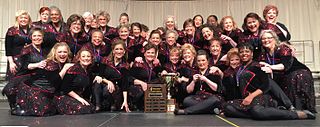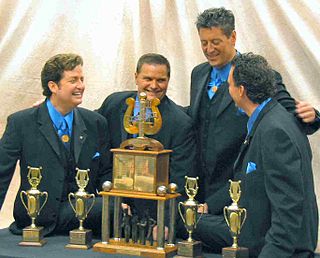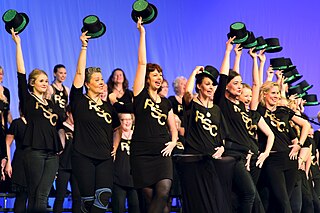
The Barbershop Harmony Society, legally and historically named the Society for the Preservation and Encouragement of Barber Shop Quartet Singing in America, Inc. (SPEBSQSA), is the first of several organizations to promote and preserve barbershop music as an art form. Founded by Owen C. Cash and Rupert I. Hall in Tulsa, Oklahoma in 1938, the organization quickly grew, promoting barbershop harmony among men of all ages. As of 2014, just under 23,000 men in the United States and Canada were members of this organization whose focus is on a cappella music. The international headquarters was in Kenosha, Wisconsin for fifty years before moving to Nashville, Tennessee in 2007. In June 2018, the society announced it would allow women to join as full members.

Barbershop vocal harmony is a style of a cappella close harmony, or unaccompanied vocal music, characterized by consonant four-part chords for every melody note in a primarily homorhythmic texture. Each of the four parts has its own role: generally, the lead sings the melody, the tenor harmonizes above the melody, the bass sings the lowest harmonizing notes, and the baritone completes the chord, usually below the lead. The melody is not usually sung by the tenor or baritone, except for an infrequent note or two to avoid awkward voice leading, in tags or codas, or when some appropriate embellishment can be created. One characteristic feature of barbershop harmony is the use of what is known as "snakes" and "swipes". This is when a chord is altered by a change in one or more non-melodic voices. Occasional passages may be sung by fewer than four voice parts.

Sweet Adelines International is a worldwide organization of women singers, established in 1945, committed to advancing the musical art form of barbershop harmony through education and performances. This independent, nonprofit music education association is one of the world's largest singing organizations for women. "Harmonize the World" is the organization's motto. It has a current membership of 23,000 and holds an annual international singing competition.

The Rich-Tone Chorus is an all-female, barbershop chorus, located in northern Texas in the United States. The group was founded in 1968 in the city of Richardson. Dale Syverson was musical director from 1976 until her death in November 2024.

The Great Northern Union is an all-gender chorus based in the Minneapolis-St. Paul area. Originally founded as a men's chorus in 1985, they performed four-part harmony in the barbershop style. Since 2020, they accept members of any genders. Officially, they are the Hilltop, Minnesota chapter of the Barbershop Harmony Society (BHS) and are active in competition. The chorus has won 11 medals in BHS International Chorus competitions, including consecutive second-place silver medals in 2011 and 2012.

The Westminster Chorus is a men's a cappella chorus based in Westminster, California. International Chorus Champions of the Barbershop Harmony Society in 2007, 2010, 2015, 2019, and 2024, and Choir of the World in 2009, they are composed almost entirely of men under the age of 40.
The Chorus of the Chesapeake is a men's a cappella chorus, based in Dundalk, Maryland. Chartered in 1957 as the Dundalk chapter of the Barbershop Harmony Society, the chorus is rich in both history and accomplishment.

Metro Nashville Chorus is a women's a cappella chorus located in Nashville, Tennessee in the United States. The group was founded in 1971 and currently has approximately 50 members. The chorus is led by Master Director Kim Wonders, a chorus member since 1979 and director since 1988.

Max Q is the barbershop quartet that won the gold medal Barbershop Harmony Society International Barbershop Quartet Contest at Denver's Pepsi Center July 7, 2007. The quartet's run for the title is featured in the 2009 feature documentary American Harmony.
Lions Gate Chorus is an a cappella choir of Sweet Adelines International, based in the Greater Vancouver metropolitan area of British Columbia, Canada. The chorus competes in Sweet Adelines International Region 26, and are the 2024 International Champions of Sweet Adelines International.
The Melodeers are an all-female, a cappella barbershop harmony chorus based in the metropolitan Chicago area.
Martini is the barbershop quartet that won the Sweet Adelines International Quartet Championship for 2012 on October 21, 2011, in Houston, Texas. SAI, "one of the world's largest singing organizations for women", has members over five continents who belong to more than 1200 quartets.

The Rönninge Show Chorus is an all-female, a cappella chorus based in Rönninge, Sweden.

The Sweet Adelines International Competitions are the annual global championships for women's barbershop harmony a cappella singing – in quartets and choruses – for members of Sweet Adelines International (SAI) and have been held annually between September and November since 1947. They are now the largest women's singing competition in the world with over 8000 participants at the 2014 convention. There are two competitions for choruses, and two competitions for quartets. Currently, the first three of these competitions are held together and form the Sweet Adelines International Convention. Over the course of competition history, the most successful chorus has been Melodeers Chorus from Chicago with seven championship titles, and the most successful quartet singer was Connie Noble who won with four separate quartets. Lustre Quartet from Baltimore holds the record for highest quartet score, and Rönninge Show Chorus from Stockholm for highest ever chorus score.
The results of the Sweet Adelines International competition for choruses in 2010–2019 are as follows.
The results of the Sweet Adelines International competition for quartets in the years 2010–2019 are as follows.

Harmony Classic is a women's barbershop competition for small and mid-sized choruses run by Sweet Adelines International as part of the organisation's annual convention since 2010. The results of the competition are as follows. For a full explanation of the scoring system, qualification process, awards and records, see Sweet Adelines International competition.

Harmony, Incorporated, is an international organization of women singers whose purpose is to empower all women through education, friendship and singing. Founded by 1959 by Peggy Rigby, Charlotte Sneddon, Mary Avis Hedges, Jeanne Maino and Mary Perry in Providence, Rhode Island, the organization currently has just under 2000 members in the United States and Canada and is closely affiliated with the Barbershop Harmony Society.

Finest Hour is a British barbershop quartet. It won the 2016 British barbershop quartet championship in 2016, and the 2017 European barbershop quartet championship. The quartet competed in the international Barbershop Harmony Society competitions in 2017 and 2019, where they placed 28th and 22nd respectively. They also hold the UK record for the highest qualifying score of 83%.
Diablo Vista Chorus (DVC) is an amateur women's a cappella singing group, based in the "East Bay" of the San Francisco Bay area. DVC is a chapter of Sweet Adelines International, the world's largest singing organization for women, with over 21,000 members worldwide. DVC primarily performs four-part-harmony works, often in what is traditionally called "barbershop" style.











